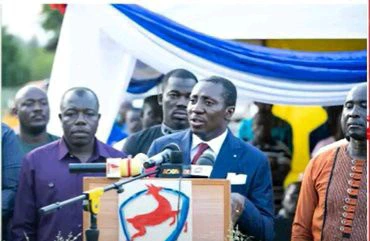Minority Leader Alexander Afenyo-Markin is facing intense criticism from both the public and members of his own party after a fiery press conference in which he harshly criticized President John Dramani Mahama’s performance during his first 120 days in office.
His comments, which accused the Mahama administration of abandoning key projects and breaking campaign promises, have been widely condemned as hypocritical and divisive.
At the press briefing, Afenyo-Markin took aim at Mahama’s “120 Days Social Contract with the People of Ghana,” citing unmet promises such as the One District, One Factory (1D1F) program, the proposed Women’s Development Bank, and various infrastructure projects including dams and warehouses. He accused the president of relying on propaganda rather than tackling real issues like rising production costs and unemployment, claiming, “This is not a president for all; it is a government for the NDC.” He also alleged that Mahama’s dismissal of public sector workers had deepened the unemployment crisis.
However, Afenyo-Markin’s statements have triggered a strong backlash. Critics have pointed to his own track record, particularly during his tenure as board chairman in the energy sector, where losses reportedly exceeded GH₵60 billion. On social media platform X, users such as @aristotledada and @KevinEkowTaylor slammed him for what they see as selective criticism, reminding him of the NPP’s own failures to fulfill promises like 1D1F during its eight years in power. “You have no shame,” one user posted, reflecting widespread frustration with his remarks.
The controversy has also exposed rifts within the NPP, with some party members distancing themselves from Afenyo-Markin’s confrontational tone. Political observers believe his attacks may be aimed at energizing the party’s base ahead of future elections, but warn that such rhetoric could alienate moderate voters.
Supporters of President Mahama have largely dismissed the criticism, arguing that it is too early to expect full results and that the administration is working to address the difficult legacy it inherited.
With Ghana facing pressing economic issues such as tax reforms and infrastructure development, many citizens are calling for a more constructive and responsible political dialogue. Instead, Afenyo-Markin’s press conference has stirred division and raised fresh doubts about his leadership approach.
Source: https://youtu.be/bVs7s1uhRy8?si=DI5E17q-D1DnrgOS












